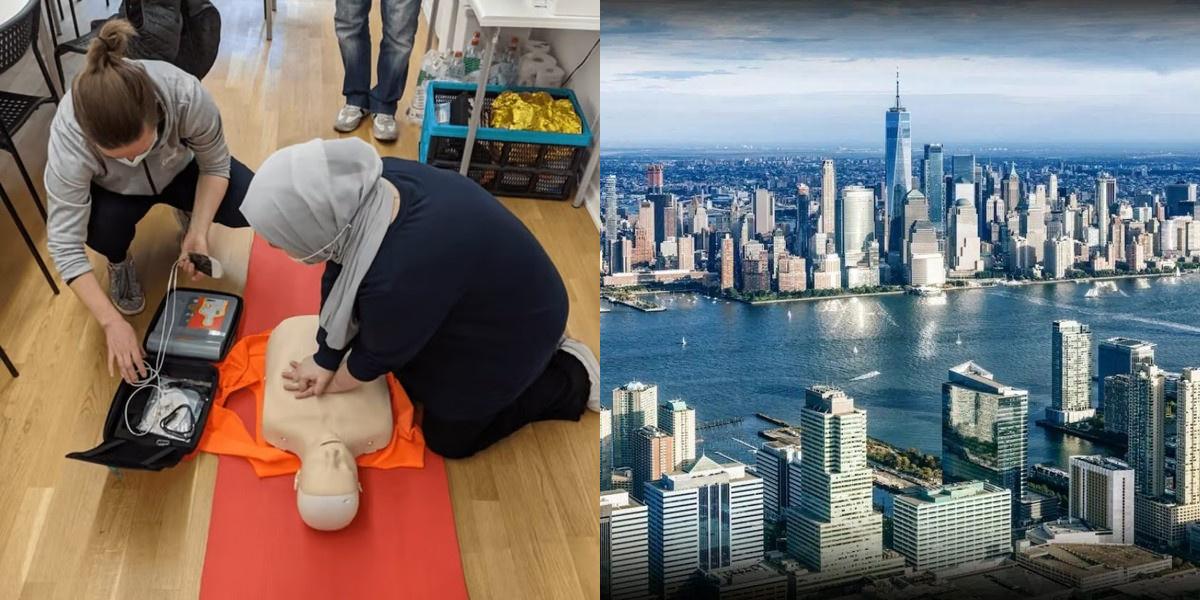How to Become a Paramedic in New Jersey (2025)

If you’re ready for a fast-paced, life-saving healthcare career, becoming a Paramedic in New Jersey could be the path for you. Paramedics provide advanced emergency care, stabilize patients, and work alongside hospitals and emergency services. According to the U.S. Bureau of Labor Statistics (May 2024), paramedics in New Jersey earn an average of $80,980 per year ($38.94 per hour) which is among the highest nationwide.
NREMT Paramedic Certification Pathways
The NREMT offers three distinct certification and renewal options depending on your education or license status:
1. Full Education Program Pathway
For students completing a paramedic program:
- Must hold current EMT certification or state EMS license.
- Graduate from a CAAHEP-accredited program or one with a CoAEMSP Letter of Review.
- Complete training within 2 years and verify competency with your program director.
- Pass the National Registry Paramedic Certification Exam.
2. State-Licensed Pathway
For applicants with a current state paramedic license or certification:
- Provide proof of a CAAHEP-accredited education and current state license.
- Complete National Registry Paramedic Certification requirements.
- Submit 30 hours of continuing education that meet NCCP standards.
3. Re-entry Pathway
For those with a lapsed NREMT certification or expired state EMS license:
- Complete 60 hours of continuing education within 2 years under the National Continued Competency Program (NCCP).
- Verify skills competency through an accredited program or medical director.
- Pass the NREMT Paramedic Certification Exam again.
Certification Tip: All NREMT-certified paramedics must renew their credentials every 2–3 years. Renewal requires continuing education and payment of a $32 fee (late renewals are $50).
Step 5: Apply for New Jersey Licensure
After passing the NREMT exam, apply for state licensure through the New Jersey Department of Health Office of Emergency Medical Services (OEMS).
You’ll submit:
- Proof of NREMT certification
- Program completion documents
- Background check and driver’s license
- State licensing fee
Step 6: Maintain Certification and Licensure
To keep your paramedic status active:
- Renew your NREMT certification every 2–3 years under the NCCP model (60 hours total continuing education).
- Renew your NJDOH paramedic license according to state renewal schedules.
- Stay current with CPR, ACLS, and PALS credentials.
Career Paths and Opportunities
With certification and licensure, you can pursue roles such as:
- EMS Paramedic – responding to 911 emergencies and trauma calls.
- Firefighter-Paramedic – serving dual roles in fire and rescue operations.
- Flight Paramedic – providing air medical transport care.
- Hospital Technician – assisting ER or trauma unit staff.
- Paramedic Instructor – teaching future EMS professionals.
- Tactical or Industrial Medic – working in specialized or hazardous settings.
Paramedic Salary in New Jersey
Per the Bureau of Labor Statistics (May 2024):
- Average salary: $80,980 per year ($38.94/hour)
- Lowest 10%: $73,500 per year
- Highest 10%: $92,840 per year
Paramedics in metropolitan areas like Newark, Jersey City, and Trenton often earn higher wages due to advanced call volumes and specialized service needs.
Explore current job openings on MyNextMove for Paramedics in New Jersey.
Frequently Asked Questions
How long does it take to be a paramedic in NJ?
Most programs take 12–24 months, depending on your schedule and EMT experience.
How much are paramedics paid in NJ?
The average annual salary is $80,980, per BLS.
What’s the fastest way to become a paramedic?
Enroll in an accelerated or hybrid paramedic program as an EMT and complete the NREMT certification within one year.
How do I maintain my paramedic license?
Complete continuing education hours under the National Continued Competency Program (NCCP) and renew every 2–3 years.
Final Thoughts
Becoming a Paramedic in New Jersey is a challenging yet deeply rewarding career choice. It requires dedication, technical skill, and compassion—but the impact you make is life-changing. With accredited training, NREMT certification, and state licensure, you’ll be ready to join one of the most respected fields in emergency healthcare.
Start your journey today! Find accredited paramedic programs near you on Dreambound and take your first step toward saving lives in New Jersey.
Looking for a better fit? These other articles could be more in line with your expectations if this one isn't precisely what you had in mind:

Athena is Co-founder and CEO of Dreambound.




